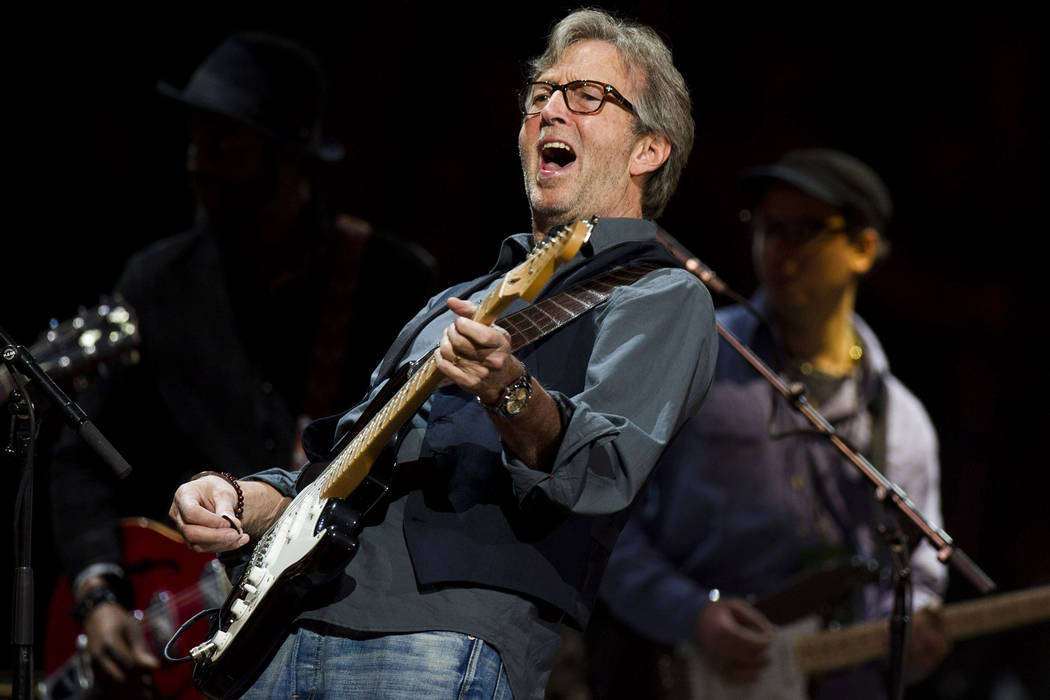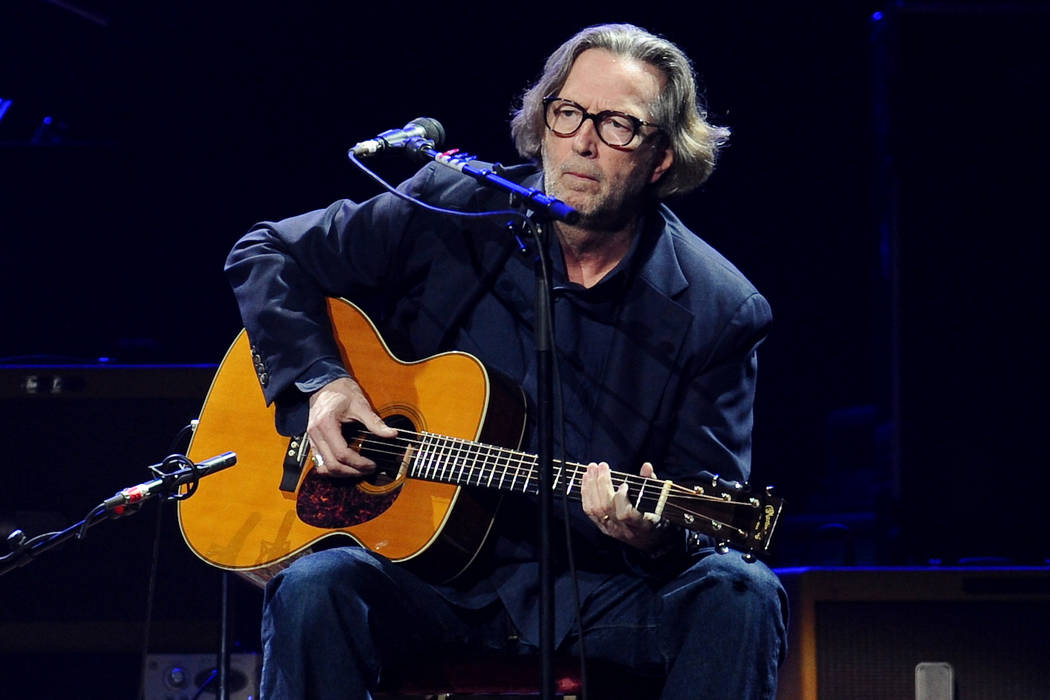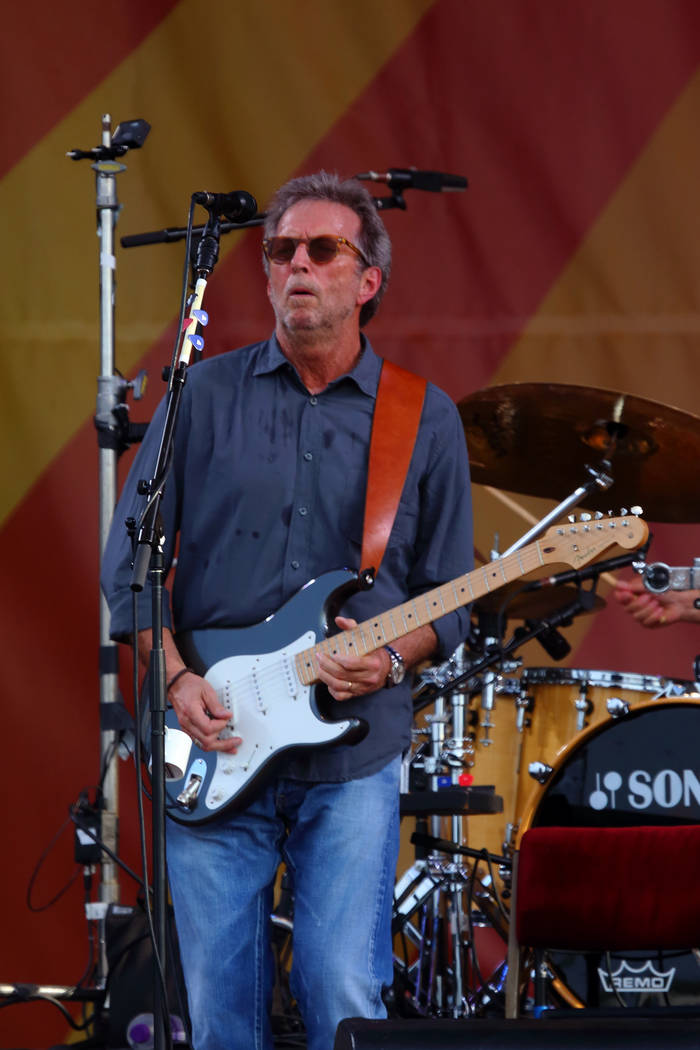Guitar great Eric Clapton returns to Las Vegas
He’s the deity with the dirty face.
“Clapton is God.”
Said slogan was graffitied all over London five decades ago.
It was a spray-painted sign of the times: Eric Clapton was on his way to becoming one of the most decorated musicians of his day or any other.
He’s roundly considered one of the greatest guitarists of all time, won a boatload of Grammys, sold more than 100 million records and even opened his own substance-abuse center to help recovering addicts.
Yet Google “Clapton” and “overrated” and you get 17 million hits.
Do the same with his late peer Jimi Hendrix and you get 38,400 results.
There are entire online forums dedicated to Clapton crushing.
So why does he get so much flak?
Why is one of the most influential six-stringers ever such a polarizing player?
With “Slowhand” headlining T-Mobile Arena on Friday, it’s time to try Clapton’s case in the court of public opinion.
Now for the charges against him:
He disbanded Cream for superfluous reasons
Clapton broke up an iconic supergroup because of a music critic?
Seriously, what kind of sad, sad soul pays attention to music writers? (Cough)
Don’t you have something better to do, like attempt to teach your toaster Spanish or eat broken glass?
But, as legend has it, Clapton broke up Cream largely because of a scathing review by Rolling Stone scribe Jon Landau, who branded the guitarist a “master of the blues cliche.”
Oof.
Did he follow up by drop-kicking the dude’s dog off a bridge?
Alas, Landau was wrong: Cream ruled.
In terms of sheer rock ’n’ roll heaviness at the time, they were a tire iron in a sea of paper clips.
Sure, Black Sabbath may justifiably be seen as the fathers of heavy metal. But Cream set that table with a bunch of brick-thick filets in the form of cast-iron riffs and one of the more domineering rhythm sections ever in drummer Ginger Baker and bassist Jack Bruce.
They came into their own on their second record, 1967’s “Disraeli Gears,” a psychedelic mushroom cloud.
This was Flower Power with thorns.
Nevertheless, Cream lasted just two years — and still rightly made it into the Rock and Roll Hall of Fame in 1993.
It’s probably unfair to blame Clapton alone for the group’s split even if he was the one who initiated it: Skill sets and egos were equally outsize, resulting in near-constant tension.
“It felt like I was in a confrontational situation 24 hours a day,” Clapton told the U.K’s Uncut magazine in 2012.
Then there was the notoriously difficult Baker, a cactus-prickly timekeeper with the temperament of a disgruntled volcano.
Verdict: Go watch the “Beware Mr. Baker” documentary and get back to us — not guilty.
In terms of fresh material, he’s been coasting a bit in recent decades
Clapton got sober and then released one of his most intoxicating albums.
When he kicked drugs and alcohol in the late ’80s, the record that followed, 1989’s “Journeyman,” was one of Clapton’s best and most invigorated in years, even if it bore that era’s electronic-leaning production values.
In the decade that followed, Clapton had both a creative and commercial rebirth, the former exemplified, at least in part, by his excellent “Rush” soundtrack, the latter by his smash “Unplugged” release.
Since then, Clapton has put out some fine records (1994’s “From the Cradle” comes to mind), but plenty of fare has been either flat (“Reptile”) or forgettable (“Back Home”) or both (“Pilgrim”).
What’s more, his most recent release is the always undignified Yuletide cash-in “Happy Xmas,” the artistic equivalent of wiping one’s drippy, cold-season sniffer on your stocking.
Verdict: Time to shed some “Christmas Tears” for real — guilty.
Too many of his most well-known, beloved tunes are cover songs
“After Midnight. “Cocaine.” “Crossroads.” “I Shot the Sheriff.” Definitely not “I’ve Got a Rock ’n’ Roll Heart.”
Yes, it’s fair to point out that a decent chunk of the Clapton discography consists of cover tunes.
In the setlist from his most recent tour this past summer, nine of the 15 tunes were penned by other artists.
But, as usual, context is crucial here.
Above all else, Eric Clapton is a bluesman. And it’s a part of the blues tradition for artists to play one another’s tunes.
It goes back to the music’s African American origins, where songs doubled as stories meant to be shared, an important vehicle for expressing the life experiences of a group of people whose voices often went unheard.
Think of the blues as much as a language as a form of music, its own vernacular with a shared glossary of terms — or, in this case, songs — to be spoken in whatever manner feels right to the performer.
Clapton’s musical pedigree is rooted in this culture, and his songbook reflects as much.
Besides, even the staunchest Clapton critic can’t deny that he makes these songs his own — in fact, this might be what cheeses them off the most.
Verdict: “Blow Wind Blow” those naysayers away — not guilty.
Contact Jason Bracelin at jbracelin@reviewjournal.com or 702-383-0476. Follow @JasonBracelin on Twitter.
Preview
Who: Eric Clapton
When: 8 p.m. Friday
Where: T-Mobile Arena, 3780 Las Vegas Blvd. South
Tickets: $69 and up (888-929-7849)




















